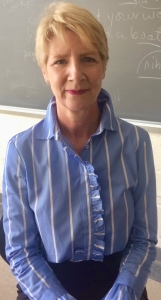
As students, we have all taken classes that have contributed to our understanding of the world at varying levels. Some have been better than others, depending on our interest in the subject matter. If we are lucky, however, we encounter a professor who completely reshapes our understanding of a subject, whether it initially interests us or not. For many Goucher students, Mary Marchand is one such professor.
For 22 years, Prof. Marchand has directed the American Studies program. Goucher was one of the first colleges to offer this radical, interdisciplinary program in 1949, only one year after Yale. With only one core course requirement, the little known major allows students to draw from three different programs in order to define the Americas- its history, its cultures- for themselves. In fact, Prof. Marchand was also the program director for Individualized Interdisciplinary Majors for 10 to 15 years. She thus teaches several literature courses, both as part of the program and the English department.
Prof. Marchand grew up in Minnesota, where she graduated from the University of St. Olaf with a major in English and minor in Philosophy. She earned her Master’s and PhD at the University of Wisconsin. Despite three job offers in very different parts of the country, circumstances brought her to Maryland, where she fell in love with Goucher. “There is a kindness and quirkiness to my students that I really value… like a sort of openness and curiosity,” she explains.
Prof. Marchand believes that literature plays a special role in developing broader perspectives on the world and bridging divides. “Stories are like events best undergone as a group,” she says. “They help us broaden our perspectives on life and move past our individual assumption.” When we delve into the literary world, she explains, “we often read and understand points of view we would normally see as unforgivable.” Literature is meant to break rules, as well as challenge the status quo and ourselves as individuals, a process that Prof. Marchand sees as integral to the college experience. In her opinion, it is especially important in our time when assumptions are being made by the left and right. To her, college is a place to bring conflicting opinions together and experience friction. Yet it also has to be a place where people have the opportunity to participate in open discourse. This is probably the greatest challenge for her as a professor: creating a safe enough space for everyone to have a say while still encouraging a diversity of opinions.
Despite this dilemma, Prof. Marchand’s courses are reputed for their engaging conversations- a term she prefers over the contrived word ‘discussion’. Through these conversations, she explains, “most of the classes kind of just reveal themselves.” For example, students find meaning in an American literary canon often written off as dull and impractical. The key is “to ask the types of questions that lead to better understanding or thinking,” which is one of many lessons she learned from her favorite professor and role model: her dad. He was a professor of humanities and director of theater at the University of Minnesota. “My dad… loved his work so much. He thought that one of the most important things in the world was to make people fall in love with learning again,” she explains. “[His] special gift was to listen intently.” Just like her father, Prof. Marchand values everyone’s voice in the classroom, earning the appreciation of many of her students.
In addition to her father’s mentoring, teaching for the Goucher Prison Education Program for two and a half years deeply shaped Prof. Marchand’s teaching style. “It was life changing. It was the most meaningful work I’ve ever done.” Working with people largely shut out of education from a very young age, she had to find ways to increase their joy and confidence in learning, separating their anxiety from their coursework. “It made me a better professor.”
When Prof. Marchand isn’t busy teaching classes or grading papers, she loves to cook. “You can see my ribbons there,” she points to her office board, chuckling. “I entered the [Maryland State Fair] contest as a joke one year; my son at the time entered in a logo contest, my husband entered a photo contest, and it kind of became a quirky thing we started doing.” She envisions a Goucher cooking standoff between departments, though she ponders about whom might be the appropriate judges.
She also spends her time between classes researching for her newest project on crime scene photography. Fascinated by early forensics of late 19th century France, she examines how identity was determined at that time using biometrics. She is currently looking for student researchers to join her in this endeavor! Perhaps this is not your primary field of interest, but with the guidance of a dedicated and beloved professor it is sure to be a transformative experience.
